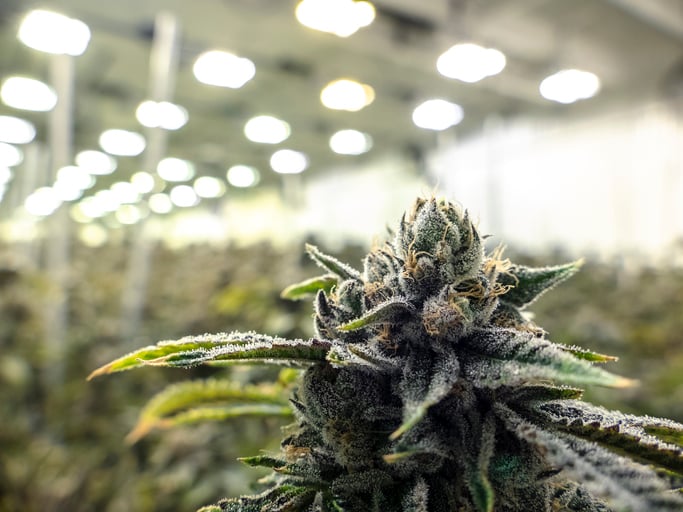Last year was a terrible year for cannabis stocks, and Canopy Growth (CGC +1.27%) -- the largest marijuana company in the world by market cap -- did not escape the bloodbath. The Ontario-based pot grower's shares decreased by 21.5% during the 2019 calendar year. By contrast, the S&P 500 climbed by about 30% during the year.
Several issues played a part in Canopy's poor performance last year. Most notably, because Health Canada was slow to issue retail cannabis licenses, there haven't been enough cannabis stores to meet the demand in the Canadian market, particularly in the province of Ontario.
Several company-specific scandals also dragged down the entire industry. For instance, CannTrust Holdings (CTST +0.00%) was in a world of trouble after Health Canada discovered the company had grown weed in several unlicensed rooms for months and sold it. This debacle eventually led to CannTrust's license being taken away by Health Canada.
Yet Canopy will look to perform better this year despite last year's trouble. Here are two reasons why it could bounce back in 2020:

Image source: Getty Images.
1. Leading market share
Canadian cannabis companies got some great news at the end of last year: The number of retail cannabis stores in Ontario will increase this year thanks to some crucial changes the government will be implementing. Here are a few of those changes:
- The government of Ontario will remove a cap it previously had on the number of retail cannabis stores allowed in the province.
- Ontario will tweak the process to obtain the license required to operate cannabis stores. Previously, only winners of a lottery were invited to apply for a license. This requirement will no longer exist.
- Cannabis companies will now be allowed to open retail cannabis stores on their premises once they receive the proper regulatory green light to do so.
How will these changes affect the number of cannabis stores in Ontario? The government expects that the first 20 retail licenses will be issued in April, and licenses will continue to be issued at an average rate of about 20 per month. At first, license holders will be allowed to open a maximum of 10 retail cannabis stores, but that number will eventually rise to 75 by September 2021.
While it's excellent news for the entire cannabis industry in Canada, this new development will likely benefit Canopy even more than most of its peers for one reason: The company has a leading market share in the recreational cannabis market in Ontario (and in most other provinces for that matter). During the company's earnings conference call for the second quarter of its fiscal year 2020, then-CEO of Canopy Growth Mark Zekulin said:
Canopy also continues to hold the strongest market share in the Canadian recreational market, with still over $1 in every $4 spent at the till being spent on a Canopy product in our estimation. Canopy is No. 1 still in Ontario, No. 1 in Nova Scotia, No. 1 in PEI and No. 1 in Alberta, the country's most developed market at over a 35% market share. In Québec, we are No. 2, only behind HEXO.
With its leading position in the recreational cannabis market in Ontario, Canopy is ideally positioned to profit from the rollout of more cannabis stores.
2. Derivative products
The market for derivative products, such as cannabis-infused beverages and vaping products, officially opened in Canada on Oct. 17, 2019. However, cannabis-store license owners were required to give Health Canada 60 days notice before starting to sell derivative products, and the expectation was that these products would first be available in retail cannabis stores in mid-December.
In November, Canopy unveiled its initial portfolio of derivative products. This lineup includes non-alcoholic cannabis-infused beverages such as Tweed RTD, a canned drink with three flavor options, each containing 2 mg of tetrahydrocannabinol (THC).
Canopy's lineup also features chocolate bars, including Tokyo Smoke Pause, a dark milk chocolate product that contains 2 mg of THC in each square, and very little cannabidiol (CBD). Canopy's derivative products will become available in cannabis retail stores starting later this month.
Of course, Canopy will have some strong competitors to contend with in the cannabis derivative market. HEXO (HEXO +0.00%) and beverage maker Molson Coors (TAP 0.71%) launched a joint venture, called Truss Beverages, which will also produce cannabis-infused drinks. Tilray (TLRY +0.00%) will also take part in this market via its joint venture with Anheuser-Busch InBev (BUD 0.25%), called Fluent Beverages.
However, thanks to its already strong position in the market for recreational cannabis products, Canopy is in an excellent position to profit from the derivative products market.
Is Canopy a buy?
Even with 2020 gearing up to be a better year for Canopy, I still don't think the company is an attractive investment option. With its most recent financial results falling far short of expectations, and its most recent balance sheet showing almost $2 billion in goodwill (which could lead to significant writedowns in the future and negatively affect Canopy's bottom line), it might be better to take a wait-and-see approach with Canopy.









